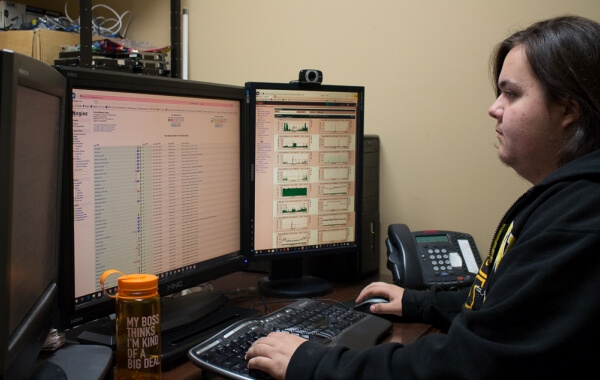In this second part of our three-part series on data protection, we will provide you with practical tips on how to best protect your data. In Chapter 1 we defined data protection and took a look at why it is important to learn how to best protect your data, and in our final part, Chapter 3, we will look at the 2019 trends in data protection. If you are concerned about data protection and would like some expert advice on how to implement a data protection plan for your business, contact Digital Service Consultants today.

How to Best Protect Your Data
Any data that is on a network or the Internet, whether personal and business, is susceptible to being stolen, corrupted, compromised, or lost. It is important to do everything that you can to protect your data and privacy, especially when you are dealing with sensitive and financial information. The following tips can apply to both the information that you have stored on your personal and business devices. Many of these tips apply to individuals as well as small, medium, and larger businesses.

There are steps you can follow to protect your data
Choose Passwords Wisely and Keep Them Hidden
It may seem obvious that you should keep your passwords safe, but you may be tempted, for the sake of easy access, to store your passwords where they can be easily obtained. Writing passwords on a sticky note stuck to your monitor is like leaving your keys in your ignition. You should also never store your passwords on or near your mobile devices.
It’s also a good idea to choose passwords that are difficult to guess. According to research done by Preempt.com, about 35% of users have passwords that are weak and about 65% of the rest can be cracked. Try using a phrase such as a line from your favorite song or a famous saying that you can remember easily instead of choosing a single word. Then use the first letter of each word in the phrase combined with some numbers and a special symbol. This will create a very strong and safe password.
Make Sure Your Data Is Encrypted
Encryption scrambles the data in your files and emails so that they cannot be read by anyone that you don’t want to access them. In the past, encryption was something that the more “techie-types” were able to do. Today, however, encryption programs make it possible for almost anyone to take advantage of.
Encryption can protect your data by making it unreadable
Always Backup Your Data
Backing up your data simply means making a duplicate copy of it, usually on a different device like a different hard drive, tape drive, or to a cloud backup service. Backups are important to have in case your original data gets lost, damaged, or corrupted. You can easily retrieve and restore your data from the backup copy. Storing your backup in a different location from the original also ensures that whatever damaged your original data won’t also damage your backup. Cloud backup storage is becoming more and more popular as a great, cost-effective way to protect your data, as it is inexpensive and easy to access.

Always back up your data in case it gets damaged, lost, or corrupted
Protect Your Devices From Malware Attacks
Malware is malicious software that will get into your computer and damage your files without your consent. Some different types of malware include:
Your best protection against malware attacks is to install a good anti-virus protection program, regularly scan your computer for spyware, and don’t click on email links or websites that seem suspicious.

You should regularly scan your computer for malware
Wipe Your Old Hard Drives Clean Before Getting Rid of Them
Make sure that you completely wipe your old hard drives before you dispose of them. Just deleting files doesn’t mean that they cannot be retrieved. You should have the disks magnetically wiped or use software to wipe the disk clean. You should also destroy your old backup tapes and computer disks.
Don’t forget to completely wipe your old hard drives before getting rid of them
Turn off Your Computer When You Are Finished Using It
Once you are done using your computer, it is a good idea to turn it off. Leaving your devices on and connected to the Internet will leave them susceptible to “rogue attacks.” Leaving your computer on at all times gives hackers the time required to install malware and to carry out other cyber crimes.
Keep Up to Date with Operating System and Software Updates
Even though updates are bothersome and usually pop up at the most inconvenient times, updating your operating system is a crucial step in protecting your data. These updates have critical security patches that help protect your data from the latest threats out there. Windows operating systems are usually updated about once a month whereas other operating systems are done a little less frequently. You should also keep all of the other software on your computer up to date. Often software programs will automatically update if you have turned on the automatic update feature. This will save you from having to remember to do the necessary updates.
Keep your operating system and other software updated
Make Sure that Your Home or Business Wireless Network is Password Protected
You should set up both your home and business network with a secure password. This will ensure that any unauthorized person that is close to your wireless network will not be able to get onto it and hijack it and your data. If it is a business network you may also want to encrypt and hide it. You can hide your network by setting up your wireless access point or router so that it doesn’t broadcast the network name.
Learn more about routers and access points
Read the whole series on data protection:
Chapter 1: The Importance of Learning How to Best Protect Your Data
Chapter 2: Practical Tips on How to Best Protect Your Data
Chapter 3: How Best to Protect Your Data – 2019 Trends
How to Best Protect Your Data: Digital Service Consultants Can Help
Digital Service Consultants can help you protect your precious data. DSC has been a trusted name in the IT industry for over 30 years. We are experts in the IT field and can provide you with the safe and secure cloud backup services you need. We provide a full range of internet-related services including cloud backup, colocation, system monitoring, software hosting, dedicated email, website development and implementation, web hosting, e-commerce, security, and a variety of related products and services. We also provide network support for Linus, Microsoft server and workstation platforms, Fortinet firewalls, and Cisco systems. Contact us today for all of your internet-related requirements.
“DSC has been fantastic, responsive and knowledgeable about any issues that come up. I first had contact with them when they informed me our backup internet was out, before I even knew it was down. Pro-active and very quick in resolving the issue. They’ve also been instrumental in stabilizing our network, and assisting with a backup solution. Both of which we were in dire need of. Really great group!”
– Thomas Berg

DSC has been a trusted name in the IT industry in Atlanta for more than 30 years
DSC Gives Back to the Georgia Community
DSC is proud to be part of a thriving Georgia community and we care enough about our community to want to give something back. That is why we started the “Next Generation” training days. During the training, our students learned about the history of CPUs and GPUs. The training focused on the performance and success of different models and brands and which ones excelled during their various time periods. You can access an audio recording of the training on the DSC website for free. Click here to listen to this informative podcast.

